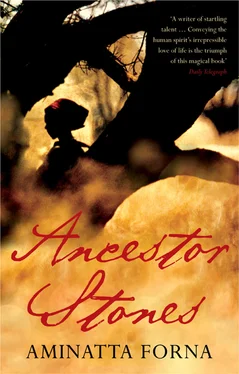I turned them all down, but it seemed as though every time I answered the door another one fell over the threshold.
* * *
Ya Jeneba and Ya Sallay did not sit on the mat. They stayed only a few days and returned to the house they had continued to share in Rofathane, coming back to help with the preparations for the forty-day ceremony.
I watched how alike the two sisters had grown over the years. Throwing their heads back and clapping their hands when they laughed and they laughed easily, the same phrases, in the same lilting voice, the same gesture, wiping sweat from their foreheads with the insides of their wrists.
Their father had been counsellor to the chief of a neighbouring chieftaincy. Jeneba and Sallay were the daughters of the same wife, belly sisters. Jeneba the eldest by about thirteen years. Their mother died before Sallay was old enough to remember her. And though she was wet-nursed by another of the wives, it was Jeneba who cared for her sister. Carried her everywhere, played with her, plaited her hair, bathed her and slept with her at night — like a favourite doll. Nobody called Sallay by her name, instead they called her Baby Jeneba. Jeneba’s marriage to my father was a dynastic one, agreed by the families. When the time came for Jeneba to leave for her new home, Sallay ran after the hammock bearing her sister away. She ran and ran until somebody picked her up and carried her back. She would not stay, so they tethered her to a tree by one leg like a goat. The child sat down and refused to eat or drink, or speak. Nobody had ever witnessed such stubbornness in one so young. Some wondered if she wasn’t one of those children who could exist on nothing but air. Whatever, if she took no food or water she would become a spirit one way or the other. The trouble was that every time they untied her, she ran away down the path and into the trees to find her sister.
So they sent her to live with Jeneba. Such arrangements were not uncommon. When Sallay reached marriage age, the two sisters wept anew at the thought of being separated. So another solution was found. Sallay became my father’s wife.
While I searched for ways to forestall my fate, my daughter seized her own destiny. She had chosen her husband: a young man from a family of bakers, softly spoken as a result of a cleft in his palate. Towards me he kept his eyes lowered, but when he looked at Kadie his gaze burned with such intensity I half expected to see my daughter swallowed up in flames. He brought her sculptures made from dough. One was fashioned as a pair of doves, another a cat curled up asleep. As his wooing grew more determined so the sculptures became more elaborate: a deer standing between the trees, a man and a woman sitting side by side, a nest of baby birds.
Kadie showed no interest in the wedding plans, was heedless of the negotiations over her bride gift. Whenever I showed her swatches of cloth she yawned and kissed me. ‘Whatever you think, mother,’ she said, before changing the subject back to her beloved.
One evening as I looked at my daughter, I thought for the first time how much the nature of love had changed, so much so it was almost unrecognisable.
And then I shook the thought out of my head, because I was her mother and, after all, one of us had to be practical.
The stores in the city sold cloth far superior to any in our town. I stared at the towering piles of folded cloth behind the shop owner. So many to choose from! She was wearing a heavy woven cotton of dark red, shot with gold thread and the highest headdress I had ever seen. I decided to ask her advice.
‘What is the occasion?’ she asked me.
I told her: my daughters wedding ashobi .
‘Come.’ She moved out from behind the counter, beckoning me over. From a glass-fronted cabinet on the other side of the room she pulled out bolts of the finest fabric I had ever seen.
‘What’s this?’ I asked, fingering an edge. Printed on two sides, too.
‘Sheku lappa,’ she said, ‘from Nigeria.’
It was a hot day, she clapped her hands for two glasses of water while we settled down to make a deal. Many dozens of yards of fabric were required to make ashobi outfits for everybody. In the time it took to agree a price we talked of many things. I learned how she travelled to Lagos and brought back the cloth herself. How her shop was the first of three stores she planned. Another in the North and then the South. In time, outlets in the East and West as well. Hours passed before we concluded our business, both of us delaying the time when we would arrive at an agreement and our conversation would come to an end. I decided I liked this woman. I liked her broad, flat face, which was honest — especially for a shop owner. We exchanged names and parted company, but I thought about our conversation for a long time. After the wedding I left Alpha with my mother and travelled back to the city. I was a widow. My daughter had just married. I had negotiated her bride gift well and since my husband was no longer alive, all of it came to me. Well, not exactly all of it. There was family to consider, but even once those obligations were met, a good sum remained. Enough to go into business.
Madam Turay shook her head at me: ‘Pack one good dress, but wear something not so good for the journey,’ she told me. I was wearing my best dress for the trip, I did not want to be shamed in the streets of Lagos.
A saltwater wind whipped our faces as the ship gathered steam. The deck tilted first to one side and then to the other, making it impossible to stand and so we stayed huddled on the floor. I stared at the sea, which from a distance had seemed so inviting but now writhed and roared like a beast. The wind sculpted the water into great white crested waves. I felt certain we would soon all be dead. I could not understand how a boat made of iron could possibly float, but I saw no creases mar the features of Madam Turay’s flat face, so I told myself perhaps we would be all right. Madam Turay found us a place near the middle of the ship, close to the great chimneys where we were sheltered from the worst of it. I pitied the poor souls out there on the open deck in front of us, and I envied the paying passengers in their bunks down below. With each movement of the ship my stomach lurched, as though it had broken free and was rolling around my insides. Madam Turay lit a small stove and set about brewing us some tea. She told me to fix my eyes on the horizon. I did as she bid me and gradually I began to feel better. The horizon looked so close, I assured myself we would be there in no time at all.
Three days and nights the ship sailed. The first night I watched the sun set behind the mountains. In the morning the coast had disappeared from view. Sometimes the sun was in one place and sometimes in another, but the horizon always stayed in the same place. When night-time came the sky burned with a million stars. But the sight of them was nothing compared to the sea. Hali! If I tell you how the sea glowed with sparkling green lights that came from the deepest parts and lit up the sides of the ship. To see it made my hair stand on end. A woman next to me — we were almost all women there — began to weep and pray. Another burst into song. A deckhand tried to calm them, telling us these were not supernatural beings but living creatures so tiny as to be invisible, but whose tiny bodies gave off a certain electricity. He took a pebble from his pocket and cast it into the sea, and where the pebble landed a flash of lights lit up the water. She did not believe him, and I only pretended to because I appreciated his good intentions.
The next day I saw a black heron flying overhead. And then a praying mantis, weighed down by sodden wings, clinging to the railing. I put her in an empty cup until her wings dried out again. I saw the flags of a line of herring boats on the horizon. We were close to land.
Читать дальше












